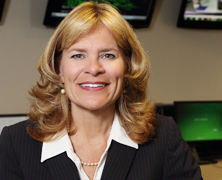The “inner work” I have done is in the area of emotional intelligence (EI). I stumbled upon this concept during a leadership meeting at a former company. As I sat with my IT colleagues, we began discussing our Myers-Briggs (personality test) results. The facilitator had us stand in a U-shape based on our scores. I was on one side of the U, while the majority of the others were on the opposite side of the U.
It was a defining moment for me. It was the first time I realized why I didn’t really understand my colleagues. I wouldn’t say we were a dysfunctional team, but we clearly didn’t understand each other. Even though we had a lot in common—we were technically competent, successful leaders—I didn’t realize how different we really were. For example, I was (am) an extrovert, and the majority of my colleagues were introverts, which is common in the IT/engineering area. I tended to brainstorm in real time, but my colleagues liked to think issues through before speaking. So, when I would initiate a discussion with a team member in the hallway about an idea I had, it never went well.
Now I realize it was better to send out an email with the idea (to give them time to think) rather than approaching them on the spot. The better I knew myself and my colleagues, the better we were able to work together. No “type” is right or wrong. But it is important to understand we are all different. This one simple tool in the (unofficial) EI tool suite is the most powerful tool I have used to successfully build stronger teams (and one-to-one bonds). This is not only satisfying in my career, but in all areas of my life.
On Finding Success and Staying Competitive
Deliver results, stay current with technology, but most important, do what they taught you in pre-school, work well with others. Your competence and proven ability to deliver will provide a strong foundation, but to truly stand out, you must be able to work with others.
On the Importance of Role Models and Mentors
My role model was a manager I had when I accepted my first leadership position in the IT field. I was a brand-new manager and had 60 IT people reporting to me. It was a complex project with strict deadlines.
As things got tough and I could see we were at risk of missing a deadline, I was extremely frustrated with the team (and it showed). My manager took me aside and told me a true leader is calm, even in the direst situations.
She said “I know you want to scream and yell, but you need to stay calm. If you aren’t calm and rational, no one else will be. You need to let your team feel comfortable telling you the bad news (even if you are dying on the inside). No one will tell you what is really going on if you always overreact.”
It is an important lesson I continue to practice to this day in my role as CIO for Kelly Services.








I enjoyed reading about your first assignment as a manager. We in IT have all been in stressful situations. I love the admonition to stay calm — easier said than done but necessary nevertheless. Thanks for sharing.